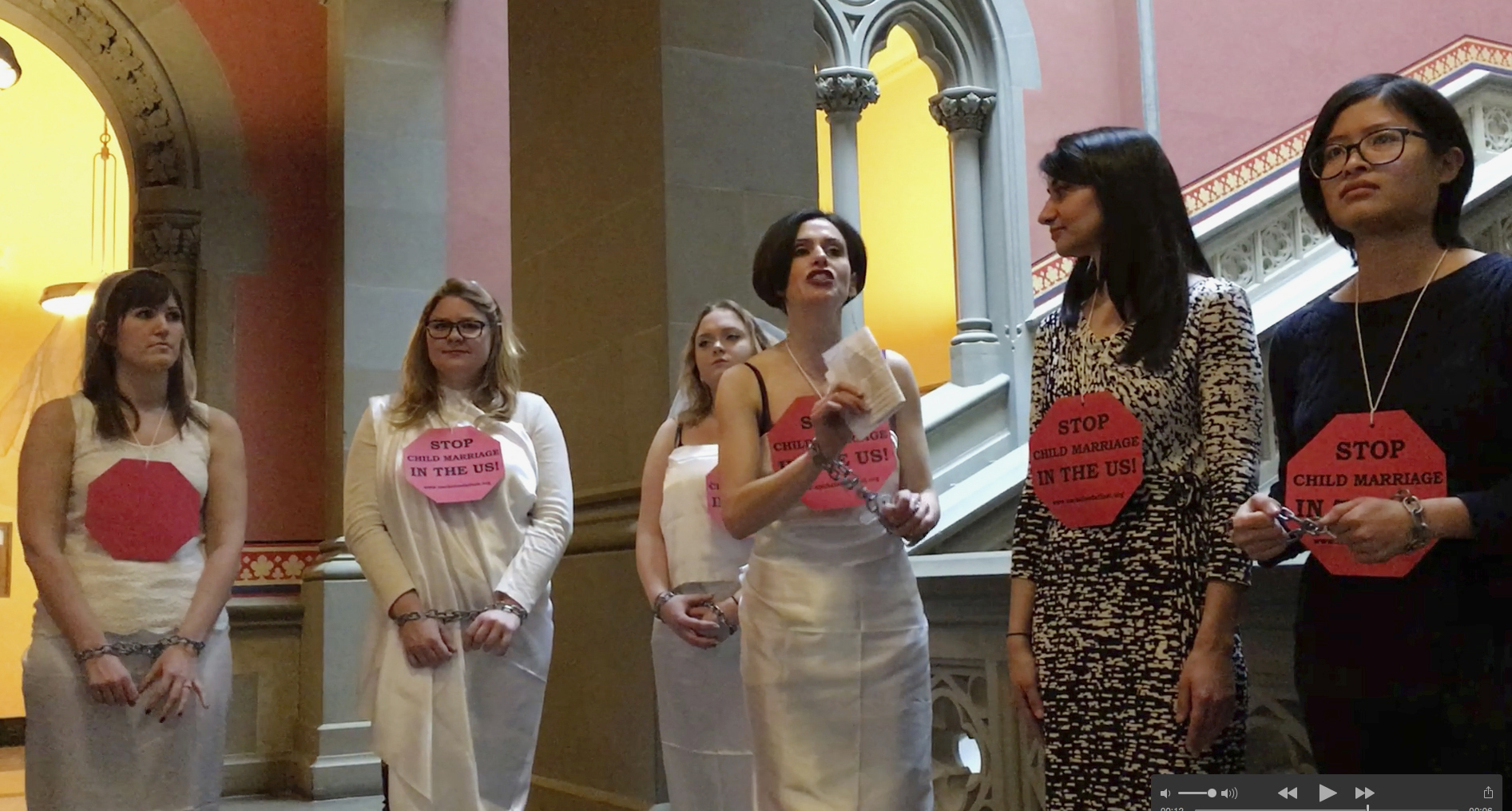Connecting state and local government leaders
Several state legislatures have pending bills that would set a mandatory minimum age of 18 for anyone to get married.
Many people think child marriage is a problem isolated to the developing countries, where the rates of children, especially girls, married before 18 can rise as high as 76%. But while child marriage may be less common in the U.S. it isn’t unheard of—and in most states, isn’t illegal.
Child marriage was legal in all states until 2018, when Delaware and New Jersey became the first two states to ban all marriage for children under 18. In most states, teenagers who are at least 16 can marry with parental consent, and in some states, judges can approve a marriage for children younger than that. In 13 states, there is no minimum age that judges can approve, leading to marriages for girls as young as 12. Six states and the District of Columbia set an age floor for approval at 14 or 15.
Fraidy Reiss, the executive director of Unchained at Last, an organization that advocates for child marriage bans in state legislatures, said that the unions are more common than most people expect. Over 200,000 children under the age of 18 were married in the U.S. between 2000 and 2015. Most were girls married to adult men. “They don’t have the basic rights of adulthood needed to enter into a complex contract,” she said. “The impacts are devastating.”
Girls married at or before 18 are 50% more likely to drop out of high school, and also more likely to live in poverty later in life. And while a teenager getting married may be taking a step into adult life, the fact that she is a minor makes it difficult to act like an adult. In most states, children can’t enter domestic violence shelters on their own or easily retain an attorney to file for divorce. “It’s a legal trap for children and a public health crisis,” Reiss said. “Almost every aspect of a girl’s life is destroyed.”
In the past three years, over thirty states have considered bills that would establish age floors or ban marriage with no exceptions before 18. The issue hasn’t sailed through state legislatures, though, but rather accumulated a set of unlikely opponents. In some cases, conservative family values advocates and liberal women’s rights groups have found themselves aligning to block the bills. Conservatives argue that any limit on marriage is government overreach, while liberals warn that the bills infringe on the rights of teenagers to make their own decisions, setting a dangerous precedent.
States Take Action
The movement to end child marriage in the U.S. didn’t take off until 2015—and many state legislators have said they aren’t aware that it’s even legal until a bill comes up for debate. For Republican state Rep. Jesse Topper in Pennsylvania, stories from people like Reiss spurred him to sponsor a bill in the state. “I hadn’t heard of the issue before,” he said. “But the more I learned about it, the more I realized what a problem it is.”
Topper’s legislation would ban all marriages before 18. Pennsylvania’s House and Senate each unanimously passed separate bills doing just that, but they are slightly different so one needs to pass both houses. Gov. Tom Wolf has said he will sign a measure into law once it appears on his desk.
The Massachusetts Senate also unanimously passed their ban this summer, and is waiting for the House to take action on the bill. Reiss said she is optimistic Pennsylvania and Massachusetts will become the third and fourth states to completely ban marriage for minors.
Legislation to create strict bans are also pending in Minnesota, Washington, Michigan, New Hampshire, and South Carolina. A bill to ban marriage before 18 failed this year in Wyoming. Other states, like Maine and Idaho have introduced bills to set an age floor of 16.

Six states have passed bans on marriage for children younger than 18 in the past few years, but made exceptions for court-emancipated minors. Reiss said she doesn't believe these exceptions are wise and advocates against states setting age floors lower than 18, saying lawmakers aren’t really tackling the issue. “We’re asking states to eliminate dangerous loopholes,” she said. “When all they do is change them, they’re not ending child marriage.”
Topper agreed. “Our bill was about setting an age where we say you can make a life altering decision,” he said. “In most minor marriages, the decision wasn’t made by the child, it was made by the parent or the adult they’re marrying. There’s no way to safeguard against that with any exemptions built in.”
Where legislators say they want more flexibility in the law, the debate sometimes revolves around teen girls who are pregnant, looking for a way to get away from abusive parents or want to marry someone about to be deployed for military service.
In Louisiana, where the youngest minor to wed in the past decade was a mere 12 years old, the state legislature passed a law this year to create an age floor of 16. The fight was emblematic of many across the country, pitting Republicans against members of their own party.
State Rep. Stephanie Hilferty, a Republican who pushed for an age limit of 17, said that marriage of underage children essentially legalized what in the case of non-married couples would be considered statuatory rape. “This is to make sure we don’t have people covering up acts of rape as a marriage,” she said on the House floor. “This is a child protection issue.”
But Hilferty was rebuffed by other Republicans, like state Rep. Valarie Hodges, who worried about children born out of wedlock. “A lot of 16-year-olds get pregnant,” she said. “Do you feel it’s better for them to not get married at all and for the child to be born illegitimately?”
In the end, lawmakers compromised on setting the age floor to marry at 16, as long as the teen has parental consent and judicial approval.
When another bill with an age floor of 16 came up for debate on the House floor in Idaho, Colin Nash, who was standing in for Rep. John McCrostie, said that the bill would be “a great opportunity for Idaho to rid itself of an infamous statistic” as the state with the highest rate of child marriage. Unchained at Last found that from 2000 to 2010, 4,080 children were married in the state, the youngest of whom was just 13. But that bill ultimately failed.
Who Makes Up the Opposition?
Unlike many other issues up for debate in state legislatures, proponents and opponents of child marriage bills don’t fall cleanly along party lines. Many lawmakers opposed to raising the age say it is a matter of personal autonomy. A lawmaker who voted against the Idaho measure said that he was “obviously … against child marriage” but that marriage shouldn’t “require government permission."
Other lawmakers have argued that there are already legal safeguards in place to ensure that marriages of young people aren’t abusive, including the common requirement that judges sign off on a teenager’s request to marry.
In Maryland, a bill to end child marriages failed in 2018 following opposition from women’s groups. Michelle Siri, executive director of the Women’s Law Center in Maryland, told the Baltimore Sun that the state shouldn’t limit the options of teens who feel that they need to marry. "We want them to have as many options as possible," she said. “If they think marriage is the best way out of a bad situation—at home or otherwise—then we're not there to stop them."
NARAL, a pro-choice organization, also opposed the Maryland bill because advocates said marriage allowed pregnant teens to access health insurance, housing assistance and other benefits. The group also feared that setting the marriage age at 18 could lead to other laws that would prevent children under 18 from accessing abortion and other reproductive care.
In California, a 2017 bill to set the minimum age for marriage at 18 failed after the ACLU of Northern California and the local Planned Parenthood affiliate both campaigned against it. The ACLU argued that the bill "unnecessarily and unduly intrudes on the fundamental rights of marriage without sufficient cause," and that "largely banning marriage under 18, before we have evidence regarding the nature and severity of the problem, however, puts the cart before the horse."
Others have also argued that child marriage laws are unenforceable, since some people will just get married in religious ceremonies, away from the eyes of the state. To those detractors, Reiss posed a question. “Murders still happen, and those are against the law,” she said. “Should we not have laws against murder anymore?”
Emma Coleman is the assistant editor for Route Fifty.
NEXT STORY: The Deferred Dream of an Equal Rights Amendment




